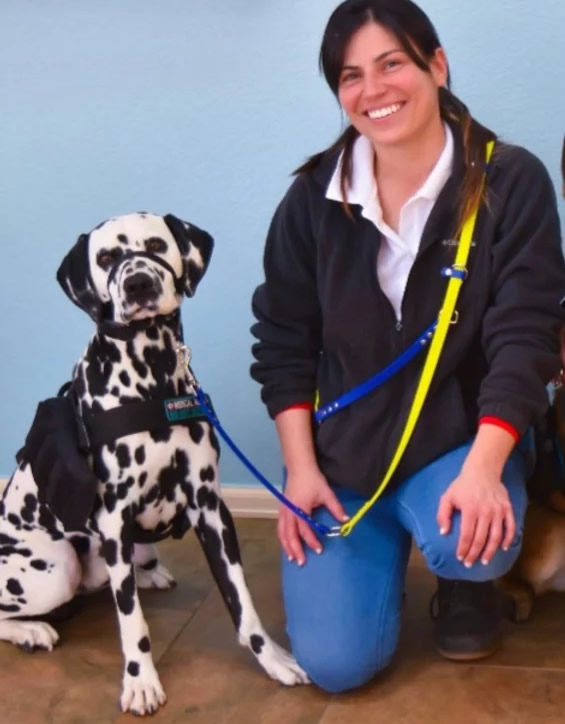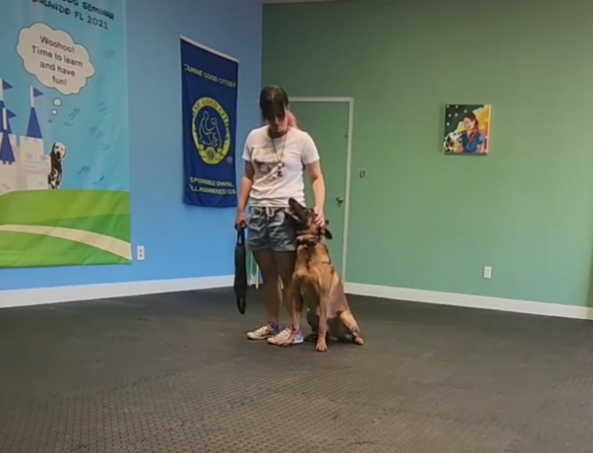
Unleashed Blog Post
Service Animals vs. Emotional Support Animals
by Jeff Lima on January 19th, 2024
Dogs have long been recognized for their unique ability to provide support, companionship, and assistance to individuals with various disabilities and emotional needs. Two common categories of these canine companions are service dogs and emotional support dogs. While both play crucial roles in improving the lives of their owners, they serve different purposes and have distinct legal rights and responsibilities. This article aims to clarify the differences between service dogs and emotional support dogs emphasizing their roles, training, legal protections, and impact.

Scroll sideways or click on the links below to examine each section and learn more about how service dogs and emotional support dogs compare…
Visit our resources and specialties page for more information about service dog training, emotional support dog training, and the laws that govern each.
Service animals are highly trained animals that assist individuals with disabilities in performing specific tasks. There are many types of service dogs including: Autism Support, Guide Work, Hearing Aid, Medical Alert and Response, Mobility Assistance, Psychiatric Support, and Multipurpose. Each of these can perform one or more from a plethora of possible tasks. depending on the needs of their handlers.
Emotional support animals provide comfort and mental health support to individuals with certain conditions such as depression and anxiety. They can help people cope with their mental health challenges. They are not trained to perform specific tasks to mitigate a disability, as service animals are.
Visit our resources and specialties page for more information about service dog training, emotional support dog training, and the laws that govern each.
Although handlers usually have great affection for their service animals, they are not pets. Legally, they are task-trained biological medical devices that empower people with disabilities.
Emotional support animals are pets that perfom mental health support services, as prescribed by a licenced and qualified professional. The comfort they provide is not recognized as a disability mitigating task by the American with Disabilities Act. While they are allowed in public places that allow animals, they are protected by the Fair Housing Act only in dwellings and are not granted the same public access rights as service animals. Still, they provide crucial support at dwelling places for many people dealing with mental health issues.
Visit our resources and specialties page for more information about service dog training, emotional support dog training, and the laws that govern each.
Service dogs are recognized under the American with Disabilities Act (ADA), providing them with significant legal protections and allowing them to accompany their owners into almost any public place. Aside from dogs the ADA does recognize miniature horses as possible service animals. The breed of the dog does not matter for this – even in jurisdictions that outlaw a breed.
Emotional support animals are protected under some laws, such as the Fair Housing Act (FHA), but they do not have the same public access rights as service animals. Technically, many types of animals can qualify as emotional support animals, but cats, dogs, and certain birds and reptiles are the most common.
Visit our resources and specialties page for more information about service dog training, emotional support dog training, and the laws that govern each.
Airlines and other transportation carriers must make reasonable accommodations to allow handlers to travel with their service animals. They travel free of charge if they can stay in the leg room in front of the passenger. Many airlines help service dog teams secure favorable seating arrangements upon request. The United States Department of Transportation (DOT) requires handlers traveling with a service animal to file a Health and Behavior Training Form. Do note that in the case of travel outside the United States, it is necessary to research specific requirements in any jurisdiction to be visited.
Many carriers, including airlines, do not allow emotional support animals and can charge for such animals to be transported. They are not granted access to public transportation vehicles in the same manner as service animals. Until 2021, the Air Carrier Access Act (ACAA) provided protections for people wanting to fly with Emotional support animals. However, since it was amended, most airlines treat them as they would any other pet.
Visit our resources and specialties page for more information about service dog training, emotional support dog training, and the laws that govern each.
Landlords are legally required by to accommodate the needs of people with disabilities that own a service animal. If a disability is not visible, they may be allowed to ask for proof that there is a disability, but disclosure of what the disability entails is not required. They cannot require training certifications or prescriptions for the service animal. However, they can ask if the animal is trained for service and what task it is trained to provide. Under the FHA, landlords are expected to accommodate for assistance animals, includingservice dogs.
The FHA enables persons with an emotional support animal prescription from a licensed and qualified provider to have their pet live with them in housing that would otherwise not allow animals. The act sets the expectation that landlords make reasonable accommodations for support animals and service animals alike.
Do note that these federal legal protections apply to long-term dwelling places. Shorter term stay locations such as hotels may still streat treat them as pets. This means that the hotel would have to be pet friendly and could still charge a pet fee. Some
Visit our resources and specialties page for more information about service dog training, emotional support dog training, and the laws that govern each.
With rare exceptions, service animals are allowed in any place that serves the public, public property, private business, institutions, schools, places of employment, parks, malls, stores, etc. They are essentially allowed to be with their handlers at all times unless their presence causes a significant disturbance to the very nature of the business (like for example, in a sterile surgery room or in parts of a zoo where certain animals could be negatively affected). Service animals are even allowed in hospital rooms and ambulances; and under certain circumstances, a handler may have more than one service animal at a time (different kinds of tasks).
Emotional support animals do not have public access rights like service animals do. They are not allowed protections that permit them in areas where animals would normally not be allowed. Essentially, their access rights pertain mostly to housing. In fact, emotional support animals in such public spaces can jeopardize the work or access of service animals. Emotional support animals handlers should be discouraged from compromising the rights of people with disabilities who benefit from a service animal.
Visit our resources and specialties page for more information about service dog training, emotional support dog training, and the laws that govern each.
In order to perform the work they do, service animals undergo extensive and specialized training tailored to their owner’s specific needs. This can be a very time consuming and expensive process. Training typically includes dog procurement and evaluation, puppy and obedience training, socialization and public access training, needs assessments
and training for service tasks, and skill testing, among others steps. It is highly encouraged that the animal be trained and tested by an experienced professional. However, this is not and cannot be required. By law, service animals may be completely owner-trained. Note that while many places extend “courtesy rights” to service dogs in training, they are not protected by the ADA. Unless a animal is already performing tasks for a person with a disability and can be under control of their handler, they cannot be considered service animals protected by the ADA. Some jurisdictions do include laws covering service animals still in training.
Emotional support animals do not typically undergo the same rigorous training as service animals. While strongly recommended, emotinal support animal training is not actually required. However, a prescription from a licensed and qualified provider is required for a pet to be considered an emotional support animal. The animal does not have to be a dog. While emotional support animals can be trained to perform tasks associated with comforting people dealing with mental health conditions that may be considered a disability, the ADA does not recognize providing emotional support as a task that qualifies for protections associated with a service animal. There are service dogs trained to provide psychiatric support, but their training is extensive and they perform specific tasks that go beyond providing comfort.
Visit our resources and specialties page for more information about service dog training, emotional support dog training, and the laws that govern each.
In addition to general costs (such as health, nutrition, housing, and engagement) associated with owning an animal, buying and/or training a service animal can be very time consuming and expensive even if one does the training themselves. For example, estimated cost of an owner-trained service dog is in the thousands – not counting the time investment. Professional training costs vary depending on trainer experience and type, as well as depth and quality of training. Fully trained service dogs often cost tens of thousands of dollars. There can also be expenses associated with training and handling equipment associated with owning a service animal.
Emotional support animals cost as much as any pet does plus whatever it costs to see a licensed and qualified mental health specialist for a prescription. As is the case with pet dogs, training is also recommended and additional costs may be incurred if a professional trainer is hired.
Visit our resources and specialties page for more information about service dog training, emotional support dog training, and the laws that govern each.
In most cases, service animals handlers are not required to disclose the details of their disability. There are specific questions that others are allowed to ask to verify the status of a service animal when there are accesss concerns. This is a good thing, so that others can make sure they belong in a public setting. Specifically, it is permissible to ask whether the animal is trained to perform a task for service and what work or task the animal is trained to perform. Any other question, including demanding documentation or certification of animal training or insurance can be a violation of access rights secured by the ADA. Asking for a task demonstration is also not allowed. Landlords are allowed to ask for verification of disability when it is not visible, but not details about it. Schools can ask for documentation of disability when families are requesting formal a accommodations under an Individualized Educational Plan protected by the Individuals with Disability Education Act or a Section 504 plan. Meanwhile, places of employment are allowed to ask for verification of someone’s disability, including diagnosis, when an accommodation request is made. Employers are also allowed to provide alternative accommodations, when possible. To avoid stress and issues associated with access, it is recommended that handlers notify landlords, schools, and places of employment of their service animal accommodation needs well in advance.
Emotional support animals require a prescription by a licensed and qualified provider that must be presented when relevant. For example, if required by a landlord. The prescription does not need to indicate the reason why the animal is necessary.
Visit our resources and specialties page for more information about service dog training, emotional support dog training, and the laws that govern each.
The ADA prohibits people from charging fees (including for cleaning) or demand insurance before granting service animals access. Handlers may still choose to procure liability, health, and property insurance.
With rare exceptions, the FHA also protects emotional support animal handlers from being charged to have their animals with them in housing units. Cleaning fees may apply in some jurisdictions.
Visit our resources and specialties page for more information about service dog training, emotional support dog training, and the laws that govern each.
As it is the case in many jurisdictions, owners and handlers may be required to provide proof of updated vaccinations for their animals. Aside from that kind of general requirement that applies to any animal, it is not required that service animals be trained by a professional, prescribed by a professional, or to be certified. Although many handlers choose to do so to warn others that the animal is working and that others should keep away or refrain from distracting it, they are not required to wear a vest, a patch, or carry identification. They must always be under handler control and it is strongly recommended that they be leashed at all times in public places. However, some service animals perform tasks that can require them not to be tethered. In such cases, they are not even required to be leashed. This applies even in places that have dog leash laws. Many handlers choose to formally skill test their service animals. This might be done through a professional trainer, obedience competitions, behavioral titles such as AKC Canine Good Citizen, or other evaluation programs. While they do this to help them have confidence that their dog is ready for service in a public setting, this is not and cannot be required. Unfortunately, there are many scams that offer service animal identifications and certifications. Anyone offering this is likely taking advantage of others who lack education or expertise, or are not well informed themselves. These scams can also contribute to an impression that such certifications are required leading to barriers to access for service animals handlers.
Owning an emotional support animal does not require specific training or certification, but landlords are allowed to ask for valid prescriptions from a licensed and qualified provider.
Unfortunately, many online scams that show up in social media ads and sponsored search engine results offer casual training, cheap paperwork, and certificates for support animals or even sometimes psychiatric service dogs. This is often done through websites that look very official and professional. Some even advertise that their certifications grant handlers public access rights, which is not true and causes confusion that can hurt access for service animal handlers. People unsure of the rules ask service animals handlers for such “certifications” that others have been “happy to provide” in the past. Indeed, it completely unnecessary to hire such services as emotional support animal training is not required. Finally, many mental health providers frown upon requests for prescription letters for support animals by non-established clients or clients that do not have a diagnosis that comes along with emotional needs that would merit such a recommendation. As it is the case with any prescription, it is considered unethical for providers to write a letter without establishing care and need. or for non-qualified people to attempt to do so.
Visit our resources and specialties page for more information about service dog training, emotional support dog training, and the laws that govern each.
The ADA does not require service animals to be registered. There is no national registry maintained by a government agency. In fact, the law prohibits such requirements. There are businesses that offer such services to help service animals handlers advocate in access denial situations. However, these are not reliable or valid sources of information; nesrly all are scams. States and local laws can and do require proof of vaccinations, as do landlords and transportation carriers. Such general registration requirements that apply to all animals often still apply to service animals.
Registration is also not required for emotional support animals – only a prescription by a licensed and qualified provider. States and local laws can and do require proof of vaccinations, as do landlords and transportation carriers. Such general registration requirements that apply to all animals often still apply to emotional support animals.
As mentioned in the previous topic, unfortunately there are many online scams that offer registration for support animals.
Visit our resources and specialties page for more information about service dog training, emotional support dog training, and the laws that govern each.
Service animals can be legally denied access if their presence disrupts the very nature of the business (see Public Access topic for more) or if they are not under handler control, show clear signs of being ill, and/or demonstrate that they are not properly potty trained or house broken. Service animals should be responsive to handler’s commands, be under handler’s control, and avoid disrupting environments beyond the performing of their task. They cannot be denied access due to claims of allergic reactions or general inconveniences to others or the business.
Even with a prescription, emotional support animals can be denied access to public transportation, including airlines, in most jurisdictions. In some circumstances, handler’s landlords can deny them access even handler’s dwelling, if there is evidence of negligence by the handler leading to damage of the dwelling by the animal.
Visit our resources and specialties page for more information about service dog training, emotional support dog training, and the laws that govern each.
Because there are no formal certifications required or even allowed, many businesses have taken up the role to create registries and certifications that are often fake and confuse some handlers, business, and employers – making people think certification or registration are required. Because there is a lot of misinformation about it or if business/employees are not properly informed, this can lead to access issues for handlers and their service animals. Nevertheless, it is not allowed for anyone to claim confusion about or ignorance of legal requirements as a justification for denial of access of service animal teams. Some advocates think formal certification would actually help reduce the number of people abusing privileges reserved for people with disabilities. However, most believe there is not a significant problem that would justify adding unnecessary barriers to access to those that need it. Certification and registration requirements would increase effort and cost associated with owning a service animal for people with disabilities – who often already struggle to afford higher than average costs of living. It would also require increase in governmental bureaucracy and costs associated with enforcement of such requirements. Although legislation and regulations have been around for decades, many business, employers, and organizations are still not properly educated about service dogs. Continued advocacy is important, but also adds an undue burden on handlers, which already have challenges associated with their disability. Sometimes, these challenges make advocacy difficult. Finally, while public knowledge is improving, handlers often have to advocate for privacy, ask others to avoid distracting their animals, refuse interactions, and have to deal with unwarranted attention. Advocacy needs continue to matter.
Ethical use of support animals is important to reduce barriers of access to service animal handlers. Unfortunately, there are people who own emotional support animals who try to pass them as service animals. Along with others who may attempt to do so for a variety of reasons, this can negatively influence others to doubt people with disabilities who own service dogs. As discussed in the previous topics of this article, similar concerns arise from people who use and brandish certification and/or registrations that are not required. Furthermore, taking an animal that is not properly trained for service to public settings can actually cause problems. Again, this can contribute to making others doubt the validity of service animals teams. In addition, such animals can expose actual service animals teams to health and physical dangers, as well as negative encounters with other animals that could even compromise the ability of the service animal to continue performing their service. This is a devastating thing considering what it takes to train them. Still, there are also issues with people disregarding the value and validity of emotional support animals. While they are not trained to do what service animals do, they can significantly help their handlers. Unfortunately, in attempts to get around housing restrictions, some people also try to fake letters, get prescription letters for support animals without a justified need, or even intentionally support scam businesses. This also compromises the social value given to the wonderful creatures that help people in need.
Visit our resources and specialties page for more information about service dog training, emotional support dog training, and the laws that govern each.
Handlers are legally liable and responsible for the behavior of their animal. Places of employment and business that grant them access are protected from liability associated with the animal’s behavior.
Handlers are legally liable and responsible for the behavior of their animals. Landlords are protected from liability associated with the animal’s behavior.
Visit our resources and specialties page for more information about service dog training, emotional support dog training, and the laws that govern each.
Service animals teams cannot be assigned to special areas or rooms to which the person living with a disability would not have been direct to had them not brought a service animal. Special accommodations may be available and be offered. For example, an airline may offer a seat with extended leg room, but cannot require a handler to purchase it or even to sit there.
The ADA and other regional laws provide for legal and civil consequences that apply to those that violate it. This includes fines, criminal penalties, and civil liability. There are several case law precedents further enforcing this. If you believe you or someone else has been discriminated against, with the persons’ consent, consult with legal advise. There are many organizations that advocate for the rights of people with disabilities. Some are linked in the resources section of our website.
People with a prescription for an emotional support animal from a licensed and qualified provider cannot be denied housing on the basis of their need or face negative consequences due to a legal request for accommodation.
The FHA and other regional laws provide for legal and civil consequences that apply to those that violate it. This includes fines, criminal penalties, and civil liability. There are several case law precedents further enforcing this. If you believe you or someone else has been discriminated against, with the persons’ consent, consult with legal advise and visit the links in the resources section of our website for more information.
Visit our resources and specialties page for more information about service dog training, emotional support dog training, and the laws that govern each.
The right of access of people with disabilities who own a service animal only applies when the animal accompanies a person they are tasking for. For example, while service animals rights apply to a person’s primary residence, they do not apply for animals left behind in a hotel room. Likewise, animals in training are often not legally protected. Many employers and business (including many airlines), choose to provide accommodation for trainers and animals in training. However, this is not required of them by the ADA. Nevertheless, in some jurisdictions, local laws do provide protection even in such cases. Either way, trainers and handlers are encouraged to take steps to ensure that animals in training are as properly prepared for for public access situations as possible, so that they do not serve as bad examples or provide negative interactions that can compromise access to or performance of working teams. Furthermore, for sanitary reasons, service animals should not eat in a restaurant or be inside a shopping cart in a store, for example. Likewise, they cannot be in public pools, but are allowed in pool decks.
Handlers that neglectfully allow their emotional support animals to be disruptive or cause property damage may lose privileges.
Visit our resources and specialties page for more information about service dog training, emotional support dog training, and the laws that govern each.
Protection of people with a disability who work for federal programs and services is covered by Section 504 instead of the ADA. In some aspects, airlines also are not under ADA purview, but fall under the Air Carrier Access Act, instead. Churches and religious organizations are exempt from the ADA (although many still choose to honor it). Schools can ask for documentation of disability when families are requesting formal a accommodations under an Individualized Educational Plan protected by the Individuals with Disability Education Act or a Section 504 plan. Meanwhile, places of employment are allowed to ask for verification of someone’s disability, including diagnosis, when an accommodation request is made. To avoid stress and issues associated with access denial, it is recommended that handlers notify schools and places of employment of their service animal accommodation needs well in advance.
This section does not apply to emotional support animals as they do not have public access rights like service animals do.
Visit our resources and specialties page for more information about service dog training, emotional support dog training, and the laws that govern each.

Another source of confusion between these categories is the existence of psychiatric service dogs that often help people dealing with issues such as anxiety, depression, and PTSD. However, unlike emotional support animals, psychiatric service dogs are highly trained and perform specific tasks for people who have disabilities associated with those conditions.
Be careful of scams that use the term psychiatric dog or even psychiatric service dog when they mean emotional support dogs. Do not support businesses that help disseminate misinformation that cause harms by compromising the access ease of people with disabilities.
Further confusion comes from the fact that service animals also can and do provide comfort and emotional support. However, they do so in addition to performing specific tasks
that help empower people with disabilities. Service animals enable handlers to better navigate life in society and to deal with stress. They help break social barriers and their companionship is a real factor in enhancing the lives of people with disabilities. So it can be said that service dogs provide emotional support, but emotional support animals do not necessarily provide disability services protected by law.
In conclusion, service animals and emotional support animals both serve important roles in enhancing the well-being of their owners, but they differ significantly in terms of training, legal protections, and public access rights. Service animals are rigorously trained to perform specific tasks for individuals with disabilities and enjoy broad public access rights under the ADA. Requiring a prescription by a licensed and qualified provider, emotional support animals provide emotional comfort to individuals with mental health conditions and their handlers are allowed to keep them in their homes, hotels, or temporary housing, even if animals would otherwise not be allowed. However, they have no legal protections to access public places, schools, and places of employment. Understanding these distinctions is crucial for individuals who rely on these canine companions and for people in society to respect and accommodate to others that have unique needs and legally protected rights. In both cases, others should do what they can to respect the work of these amazing canines. This should include keeping distance from them, preventing unnecessary distractions of them and their handlers, and more importantly, making sure they are empowered to do what they are meant to do – change people’s lives.
My LIfe Unleashed takes pride in helping people dealing with mental health challenges or living with disabilities unleash their lives with the the help of highly trained animals.
Start your journey today. Contact Us Now!
Follow Our Blog to learn more about our work and training philosophy, access information more about mental health and service dog training topics, and meet other amazing service dog teams!
Follow Our Blog to learn more about our work and training philosophy, access information more about mental health and service dog training topics, and meet other amazing service dog teams!

August 22nd, 2018 by Lisa Lima
Beyond Psychotherapy:
A Unique Approach to Living your Life Unleashed
Therapy, Dog Training

October 22nd, 2018 by Lisa Lima
Therapy:
How to Know When You Need it
Therapy, Mental Health, Wellbeing

September 9th, 2018 by Lisa Lima
World Suicide Prevention Day: There is Help!
Therapy, Mental Health, Wellbeing

September 9th, 2018 by Lisa Lima
Animal Assisted Therapy: Colorado Springs-Area Therapist uses Horses and Dogs to Break the Ice with Patients
Mental Health, ANIMAL-ASSISTED THERAPY

November 14th, 2018 by Lisa Lima
Finding Love Through Animal-Assisted Therapy
Mental Health, ANIMAL-ASSISTED THERAPY


August 27th, 2021 by Lisa Lima
3 Day Service Dog Seminar in Orlando:
Oct 22-24, 2021
Service dog training

November 7th, 2022 by Lisa Lima
Polishing Up a Few Transitions:
Some things I want him to understand here are…
Service dog training

April 23rd, 2023 by Lisa Lima
Colorado Springs
is a beautiful city to have a dog……
Service dog training

July 24th, 2023 by Lisa Lima
My Life Unleashed,
serves the Colorado Springs, CO area…
Service dog training

January 19th, 2024 by Jeff Lima
Service Animals vs. Emotional Support Animals: : Comparing helpful canines
Service dog training, emotional support animal training, mental health












